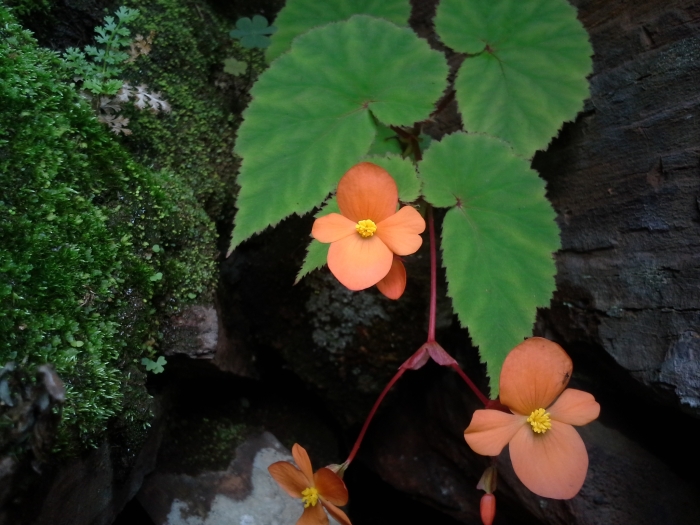Sutherland Begonia
(Begonia sutherlandii)
Sutherland Begonia (Begonia sutherlandii)
/
/

Jimmy Whatmore
Public Domain
Image By:
Jimmy Whatmore
Recorded By:
Copyright:
Public Domain
Copyright Notice:
Photo by: Jimmy Whatmore | License Type: Public Domain | License URL: http://creativecommons.org/publicdomain/zero/1.0/ | Rights Holder: Jimmy Whatmore | Publisher: iNaturalist | Date Created: 2017-01-10T12:25:19-08:00 |





















Estimated Native Range
Summary
Begonia sutherlandii, commonly known as Sutherland Begonia, is a tuberous perennial herb that can exhibit evergreen, semi-deciduous, or deciduous behavior depending on the climate. It is native to the Eastern Arc Mountains and other highland areas of Eastern and Southern Africa, where it thrives in montane forests, rocky outcrops, and grasslands. This species typically grows to 0.5 meters (20 inches) tall with fleshy pink stems ranging from 10 to 80 centimeters (4 to 31 inches) in length. The leaves are asymmetrical, dark green with red veins, and have a toothed margin. They are also covered with short hairs on the underside, which can help with water retention. The Sutherland Begonia produces showy, pendent panicles of flowers throughout the summer. The blooms are 20–26 millimeters (0.8–1.0 inch) in diameter, usually orange or orange-red with yellow anthers, adding a vibrant splash of color to the garden.
This plant is valued for its ornamental foliage and flowers, and it has earned the Royal Horticultural Society’s Award of Garden Merit. It is commonly used in hanging baskets, containers, and as a ground cover in frost-free areas. Sutherland Begonia prefers part shade but can tolerate morning sun, requiring medium amounts of water and well-draining soil to prevent tuber rot. It is relatively easy to maintain, but gardeners should be cautious of powdery mildew and botrytis, especially in humid conditions. Propagation is typically done through division of tubers or stem cuttings.CC BY-SA 4.0
This plant is valued for its ornamental foliage and flowers, and it has earned the Royal Horticultural Society’s Award of Garden Merit. It is commonly used in hanging baskets, containers, and as a ground cover in frost-free areas. Sutherland Begonia prefers part shade but can tolerate morning sun, requiring medium amounts of water and well-draining soil to prevent tuber rot. It is relatively easy to maintain, but gardeners should be cautious of powdery mildew and botrytis, especially in humid conditions. Propagation is typically done through division of tubers or stem cuttings.CC BY-SA 4.0
Plant Description
- Plant Type: Herb
- Height: 0.3-0.5 feet
- Width: 1-1.5 feet
- Growth Rate: Moderate
- Flower Color: Orange
- Flowering Season: Summer, Fall
- Leaf Retention: Deciduous
Growth Requirements
- Sun: Part Shade
- Water: Medium
- Drainage: Medium
Common Uses
Bird Garden, Butterfly Garden, Edible*Disclaimer: Easyscape's listed plant edibility is for informational use. Always verify the safety and proper identification of any plant before consumption., Fragrant, Groundcover, Hummingbird Garden, Low Maintenance, Street Planting
Natural Habitat
Native to montane forests, rocky outcrops, and grasslands in Eastern and Southern Africa
Other Names
Common Names: Mönjebegonia
Scientific Names: , Begonia sutherlandii,
GBIF Accepted Name: Begonia sutherlandii Hook.fil.